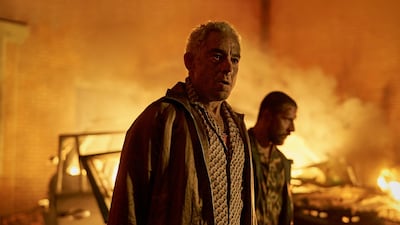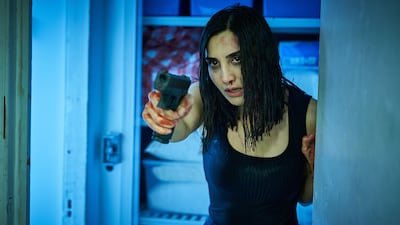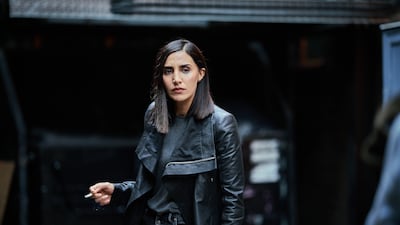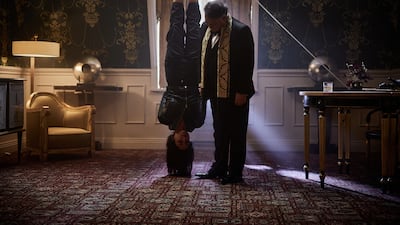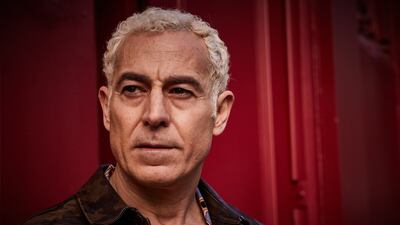It’s often said that London is one of the world’s most multicultural cities, and the brutal crime thriller Gangs of London, which returns for a second season on OSN+ on Thursday, does nothing to dispel that theory.
The show is a co-production between the UK’s Sky Atlantic and US giant AMC. It was created by Gareth Evans, the Welsh director of the Indonesian smash hit The Raid, and tells the story of warring crime gangs in the UK capital featuring representatives from the Albanian, Pakistani, Kurdish, Nigerian, Welsh Traveller and Cockney gangster communities.
It won global acclaim from audiences and critics alike when the first season made its debut in 2020, giving Sky its second most-viewed original drama launch ever (after the multi-award-winning Chernobyl) and became its most-binged show of 2020.
It also did so in Evans’s graphic, ultra-violent, trademark style, bringing a grisly realism to the screen in a manner rarely seen on prime-time TV. This trend seems sure to continue into season two, in which Evans vacates the director’s chair to make way for new lead Corin Hardy, the twisted talent behind horror hits including The Hallow and The Nun.
In among the crime and blood, we can also find two of the Middle East’s most successful screen exports. Waleed Zuaiter, the Palestinian producer and co-star of 2013’s Oscar-nominated Omar and more recently, a cast member in Hollywood immigration law drama Saint Judy, joins Gangs of London as Koba, a brutal enforcer sent to London from Eastern Europe to restore order among the warring gangs by the show’s sinister "investors" after the chaos of the season one finale.
Alongside him, Iranian-German-American actress Narges Rashidi reprises her role as Lale, the leader of a Kurdish gang whose criminal activities fund the efforts of Kurdish PKK fighters back home.
It’s a welcome sign of progress to find two Middle Eastern faces in such prominent roles when actors and filmmakers from the region are often vocally critical of the lack of representation in western film and TV, and Zuaiter is aware of the significance of the pair’s high profile in the show.

“In my opinion, this show really shows the diversity of what we can do as actors,” he says. “I hope people get inspired and can really empathise and see themselves in these roles. That they see us and realise that even if you’re from a war-torn country, you can realise your dreams if you're a performer or an actor or an artist. That they go: ‘Yeah, I can experience freedom.’ I really hope that what we do encourages others to live out their dreams.”
Rashidi says things are definitely getting better for aspiring Middle Eastern actors, though she concedes there’s still progress to be made. “I think representation of Middle Easterners in the western world is lacking. It's getting better, but it's still very little.
“But when I started off, moons ago, I had maybe one audition or two a year. I grew up in Germany, where it was even worse than it is in America and Britain. So things have gotten better, but it's a process, you know?”
It’s encouraging that both seem to think the direction of travel is positive. On the other hand, given that another criticism frequently levelled at western TV and movies is around the type of roles available to Middle East talent, with terrorists an all-too-frequent cliche, it could be argued that their respective characters are, perhaps, somewhat regressive on this front. Zuaiter plays a cold-blooded killer with a decidedly dictatorial streak, while Rashidi’s character uses the proceeds of her nefarious activities to fund an organisation that is viewed by many as a terrorist group.
For Rashidi, the most important thing at this stage in the "process" is simply to be seen. “In terms of the roles, there are a lot of cliches, but here's the thing — if we don't fight, if we're not out there, then we're not trying, so nothing’s going to change.

“So my thing is get out there, work hard, then work even harder, and then you will be seeing us and eventually people won't be able to go around us any more.”
As for her role in Gangs of London, the actress is confident that the quality of Evans and the show's writers’ work ensures that any accusations of cliche are moot. Rashidi credits Evans with creating the role of a strong Middle Eastern woman dominating in a gangster world, saying she is “forever grateful” for being given the chance to play her. “Regardless of her sex or where she’s from, we need more characters like that,” Rashidi says.
It’s an argument her co-star agrees with. “I feel like, why don't we have complex characters from our part of the world? You're either really, really bad, like a terrorist, or you're unrealistically saintly to overcorrect,” Zuaiter says. “Where's the complexity? Where's the Arab or Iranian Walter White or Tony Soprano? That's what's so exciting about Lale and Koba. We can let our imagination go wild and go free.
"This was a dream role for an actor to play, because we're not just another two Middle Eastern baddies ... And that is heroes in my vocabulary.”

